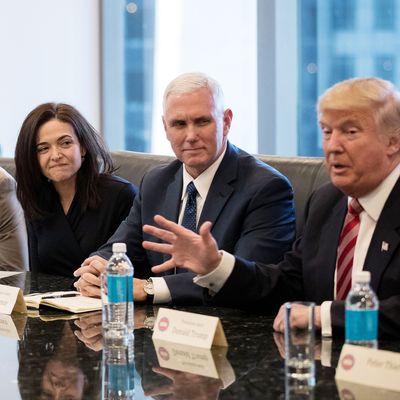
Among the political victims of last weekend’s botched executive order banning immigration from seven Muslim-majority countries, was, surprisingly, Uber. The popular ride-sharing app found itself facing a wave of backlash for appearing to break a strike at JFK (they were really just going about business as usual), and is now running damage control, as years of frustration with the company culminated in a major campaign under the simple and direct hashtag #DeleteUber. Uber’s archrival, Lyft — which, like Uber, continued to serve JFK during the Taxi Workers’ Alliance stoppage — responded by announcing a million-dollar donation to the ACLU, clearly positioning itself as the virtuous alternative.
The Uber backlash is the first consumer-level rebuke of Silicon Valley’s utopian ideals in the Trump era, and if the speed with which it came is any indication, it won’t be the last. During the election campaign, outspoken figures in the tech industry and in tech media had been calling for industry leaders to speak out more clearly about the Republican candidate. (Famed tech investor and New Zealand citizen Peter Thiel, who spoke at the RNC and advises the Trump administration, has been the focal point of many of these calls for tech to speak up.) Since the election itself, the pressure has only increased. BuzzFeed is collecting dozens of public statements from tech companies regarding the immigration ban, which hits particularly close to home given that tech companies rely heavily on international workers being granted visas.
The scrutiny placed on Silicon Valley has in turn led to some tech-sector employees feeling unfairly targeted. New York Times reporter Mike Isaac tweeted over the weekend:
According to Isaac, that’s a minority viewpoint. But it’s not wrong. Silicon Valley leadership is feeling much more pressure to speak out on Trump’s policies than, say, the manufacturing or financial-services sectors.
BuzzFeed’s Tom Gara writes:
When a serious line is crossed in Washington, there’s an assumption that Mark Zuckerberg should say something about it; nobody is holding their breath for the CEO of Bank of America. Google’s co-founder — one of the world’s richest men — showing up at San Francisco’s international airport on Saturday night to join the protests was warmly received but not shocking; the concept of Lloyd Blankfein joining the crowd at JFK is imaginable only in surrealist parody.
This is both unsurprising and warranted. More than any other industry, Silicon Valley is steeped in a set of political and ideological values — ones we might broadly call hippie libertarianism. The growth of the industry around the Bay Area in the 1970s and 1980s, narrated and given voice by the freaks and weirdos of the Whole Earth Catalog and, later, Wired magazine, meant that the natural radicalism of the tinkerers and experimenters behind the personal-computing revolution was married to a crunchy, anti-corporate philosophy that fit broadly, if not always comfortably, in the American left.
It just so happens that the hippies and beardos ended up creating work that provided the foundation for an industry worth hundreds of billions of dollars. Hippie-dippie Whole Earth-ers, with their “stay hungry, stay foolish” mantra, laid the foundation for Silicon Valley, but to borrow a tech phrase, it doesn’t scale — especially for gargantuan, publicly traded companies and regulatory targets like Facebook and Google. The latter famously used the motto “don’t be evil” until market conditions required them to … be “evil.” The Whole Earth Catalog was, after all, an actual catalogue.
But even if the companies and industry themselves have gone straitlaced and corporate, the radical ethos of the personal-computing and internet revolutions still runs in the veins of many of the engineers and developers whose products make the industry money. Some tech workers might be complaining about the pressure they’re under. But others are applying that pressure. More than 2,800 tech workers signed a pledge last year refusing to cooperate in any potential initiative to compile a database that facilitates ethnic or religious targeting. A hypothetical Facebook engineer who experiments with neural networks or facial-recognition systems — tools that could be used for great acts of malevolence — now works for a CEO that, as of last Friday, somehow still believes Trump will do the right thing when it comes to immigration policy.
Avid tech consumers, too, have, quite literally, bought into the values of Silicon Valley — they purchased products that not only made them more efficient, but also signaled their values. To consume tech rabidly was to envision a utopian world built by coders, where apps afforded everyone a sufficient level of opportunity and comfort. Buying a phone with a great selfie camera wasn’t just a practical choice; it was one that allowed you to forge real human connections by sharing great pics with friends. Getting 10 percent off a new Apple device by recycling your old one was doing real good for the environment.
The rise of the smartphone coincided nicely with the liberal Obama administration, which lavished the tech industry with praise as the future of American industry. We might not make iPhones here, but we can sure as hell design them in Cupertino and write the software that’s put on them. It was easy to be liberal when the government was in your corner. Now, industry watchers and workers, and high-minded consumers, are wondering whether the tech industry’s top CEOs, faced with actual resistance at the highest levels of the federal government to their supposed core values, can walk the walk as well as they talk the talk.





























